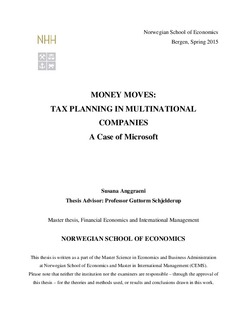| dc.description.abstract | This thesis presents tax minimisation strategies, how multinational companies use them and what
regulations and actions that international policymakers and national governments use to tackle
aggressive tax planning. Theories and relevant literature are used to describe and confirm the use
of these strategies by multinational companies.
Focusing on Microsoft, various tax minimisation strategies are used by this company to
minimise and even avoid the tax liabilities. By exploiting the loopholes in the U.S. and international
tax regulations, Microsoft is able to avoid U.S. withholding tax and tax on the income
passive. Their international operations and geographic locations are structured for the tax
minimisation purpose. Internationally, Microsoft uses the operation centres in Singapore, Ireland
and Puerto Rico to transfer the intellectual property rights and to retain the foreign income
outside the United States avoiding the U.S. withholding tax. Using disregarded CFC entities,
Microsoft shifts the intellectual property between the subsidiaries in the low-tax jurisdictions
without being taxed. Microsoft manages to "bring" back the foreign income to the United States
untaxed through investment in the U.S. financial markets done by the foreign subsidiaries.
Double Irish Dutch sandwich is also used to channel the profits further to Bermuda. Microsoft
operation in Norway seems to be used for the tax purpose as it is financed by debt and is loaded
with high operating costs. There is also an indication that Microsoft shifts the revenue from North
America to Norway. The sales from Norwegian market are booked in Ireland through
Luxembourg. Even though there are value-added activities in Norway, Microsoft claims that
there is none and due to residency-based tax regulations, only six percent of the total sales in
Norwegian market are recognised as taxable income in Norway. Lack of transparency due to the
use of tax havens increases the conviction of aggressive tax planning done by Microsoft.
Microsoft's business model involving intellectual property is one step ahead of the existing
tax regulations. Some actions have been taken to mitigate any practices of exploiting the existing
regulations. Future development seems promising as more countries are involved. | nb_NO |
